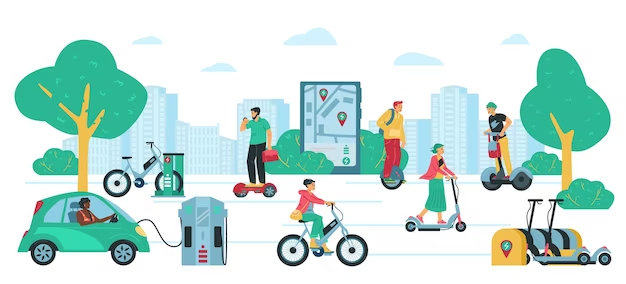
Shared Mobility: Moving Towards an Integrated Approach
Despite the downturn in adoption of shared mobility services due to COVID-19, the shared mobility market has emerged strongly driven by new business models, city initiatives, electrification, and connected technology. Emerging city initiatives such as development of 15-minute cities, restructuring of transport infrastructure such as bike and high occupancy lanes, car free city centers, and development of shared mobility hubs would be instrumental in catalyzing adoption of shared mobility services. Some of the key shared mobility services include:
1. Ride-Hailing:
Ride-hailing services like Uber, Lyft, Bolt, Gett, Grab, and Ola have continued to expand globally, offering on-demand transportation through mobile apps. New business models have included subscription plans, loyalty programs, and partnerships with other companies (e.g., Uber Eats).
2. Car Sharing:
Car-sharing services like Zipcar, Enterprise's CarShare, and Free2Move allow users to rent vehicles for short periods, often by the hour. Car-sharing companies have introduced flexible pricing plans, electric vehicle options, and integrated services with public transportation.
3. Demand-Responsive Transit:
Companies like Via, Ioki, The Routing Company, and Padam Mobility provide on-demand transit services that optimize routes based on real-time passenger demand. Demand responsive transit can replace uneconomical public transport routes, thereby increasing the overall efficiency of a city’s mobility system. Pricing models often include flat fees or dynamic pricing based on distance or time.
4. Mobility-as-a-Service (MaaS) and Digitization of Public Transport:
MaaS platforms like Whim, Trafi, Skedgo aim to integrate various transportation services into a single app, offering users a seamless experience across public transit, ride-hailing, bike-sharing, and more. Pricing models include subscription plans and pay-as-you-go options. Customers can leverage real-time information, trip planning, booking and ticketing services through apps. Integration of payment platforms is expected to drive further adoption of MaaS by increasing convenience and single accounting. Companies such as Masabi, SkedGo, and Trafi offer digital solutions to enhance public transportation.

80% of the Forbes Global 2000 B2B companies rely on MarketsandMarkets to identify growth opportunities in emerging technologies and use cases that will have a positive revenue impact.
- Food Packaging Market Size Set for Strong Growth Through 2030 Amid Rising Demand for Convenience Foods
- Fertilizers Industry Set to Grow at 4.1% CAGR Through 2030
- Leading Automated Guided Vehicle Companies 2024: An In-depth Analysis
- CHARGED UP: SHIFT TO E-MOBILITY AND THE EVOLUTION OF TRANSPORTATION
- Global Automotive Market: Predictions For 2024
While the automotive industry’s core focus has been on electrification, connectivity, and autonomous, the future of mobility scenario is incomplete with the shared mobility concept since it mitigates the core urban challenges of congestion and sustainable transportation. Leading automaker initiatives include -
Volkswagen Group: Volkswagen has actively been investing in mobility services such as electric DRT under its MOIA brand and is developing purpose-built electric vehicles for ride-hailing and shuttle services. Its carsharing arm, WeShare, has been acquired by Miles Mobility. The automaker is also developing autonomous taxis and delivery vans.
Stellantis: Stellantis’ acquisition of leading carsharing service, Share Now, under its Free2Move brand has led to the company having access to over 6 million customers for car rental, car sharing, and car subscription services while developing mobility hubs across Europe.

Other automakers such as Hyundai (Mocean and VIVe) and Toyota (Toyota Share and Kinto) have invested in carsharing services. Automakers are designing purpose-built vehicles for shared mobility to meet the specific needs of ride-hailing and shuttle services, including features like increased passenger space, easier maintenance, and enhanced connectivity. Kia and Renault are developing purpose built vehicles for the taxi market. Most of the automakers also have significant stakes in the autonomous mobility market. Ford: Ford acquired Spin, an electric scooter-sharing company, and is investing in autonomous vehicle technology for future mobility services. Cruise is GM’s autonomous subsidiary while partnerships such as Stellantis-aiMotive, Mercedes Benz-Luminar, Volkswagen-Innoviz & Mobileye, and Hyundai-Aurora are defining the emerging age of autonomous mobility
Authored by Shweta Surender, MarketsandMarkets
- Mobility as a Service Market by Service (Ride-Hailing, Car Sharing, micro-mobility, Bus, Train), Solution, Transportation, Vehicle, OS, Business Model, Payment (Subscription, PAYG), Commute (Daily, Last Mile, Occasional) Region - Global Forecast to 2030
- Ride Sharing Market by Type (E-hailing, Station-Based, Car Sharing & Rental), Car Sharing (P2P, Corporate), Service (Navigation, Payment, Information), Micro-Mobility (Bicycle, Scooter), Vehicle Type, and Region - Global Forecast to 2026


